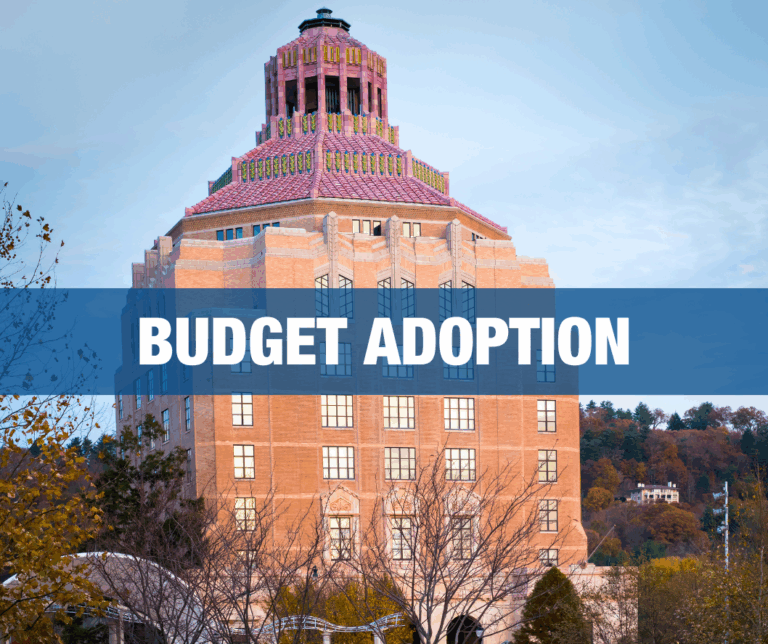Asheville City Council has approved a $256.36 million budget for the fiscal year 2026 (July 1, 2025, to June 30, 2026). This budget, reflecting long-term strategies and priorities, was developed based on council priorities, community feedback, and staff contributions. The approval vote occurred during the Council’s meeting on June 10.
The budget includes a change to the current property tax rate to 44.19 cents per $100 of assessed valuation to fund continuing current operations, employee compensation adjustments and to maintain fund balance and a strong credit rating.
Council Priorities
The budget reflects Council’s commitment to four strategic priorities defined at their retreat in February:
- People – Housing stability, emergency relief, and support services
- Economy – Supporting local businesses, workforce recovery, and food security
- Infrastructure and Environment – Strengthening critical infrastructure, improving storm resilience, and protecting Asheville’s resources
- Housing – Affordable housing solutions and rebuilding efforts
Community Input
Community input, through the Recovery Priorities survey, a public comment session on February 25 and the public hearing on May 27, was a factor in guiding the FY26 budget. Priorities identified by the community included:
- Strengthening infrastructure
- Expanding housing solutions
- Supporting economic recovery
- Enhancing food security
- Maintaining sustainability focus
Guiding Principles in Developing the FY26 Budget
The development of the budget for fiscal year 2026 focused on providing funding to maintain the City’s core services and minimizing cost increases to residents and businesses during the Helene recovery. One time revenue sources such as CDBG-DR and FEMA are being used to fund the community’s recovery priorities.
Key Highlights
The budget, which goes into effect July 1, 2025 is a balanced and fiscally responsible spending plan that includes:
- Maintaining existing city services at their current levels, including protecting public safety, supporting public spaces, maintaining cleanliness, preserving infrastructure, boosting economic development, enhancing water quality, and more.
- 3.0% compensation increase for all permanent staff on the General Pay Plan whose salaries are above the median pay of $58,000 and $1,740 flat increase for those below the median.
- Moving sworn officers in the Police Department to a new pay plan, which includes compression adjustments and a 3% one-time payment to officers not receiving a compression adjustment.
- 3% compensation increase for employees on the Fire pay plan, plus funding to establish a new shift structure and 3 additional firefighters for the Fire Department, which will begin a long-term process of decreasing firefighter hours by adding new staff.
- $5M in one-time revenues from a FEMA Community Disaster Loan to cover decreased revenue projections after Tropical Storm Helene.
- A robust capital program which includes Helene recovery projects, General Obligation Bond projects, and other capital improvements.
The ordinance, the legal document which adopts the budget, has been signed by the Mayor and is posted online. The Adopted Budget Document will be posted on the City’s website in July.
